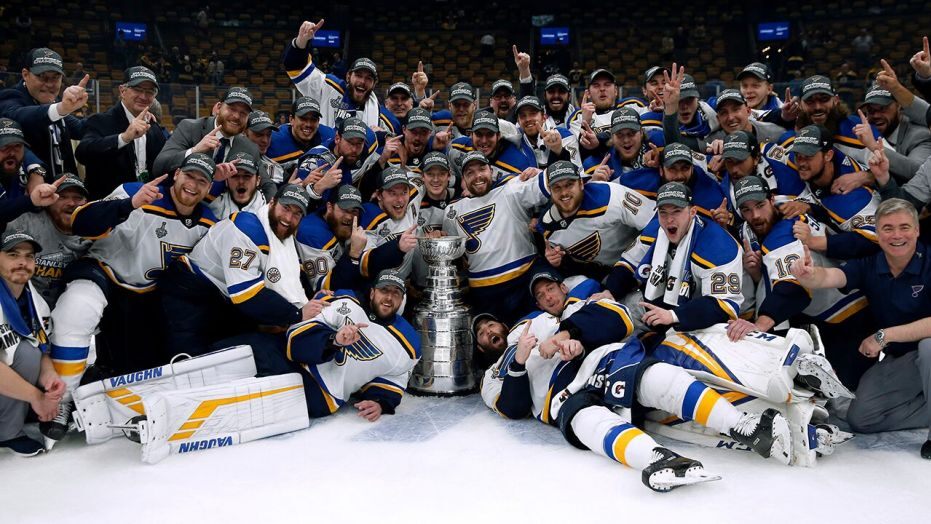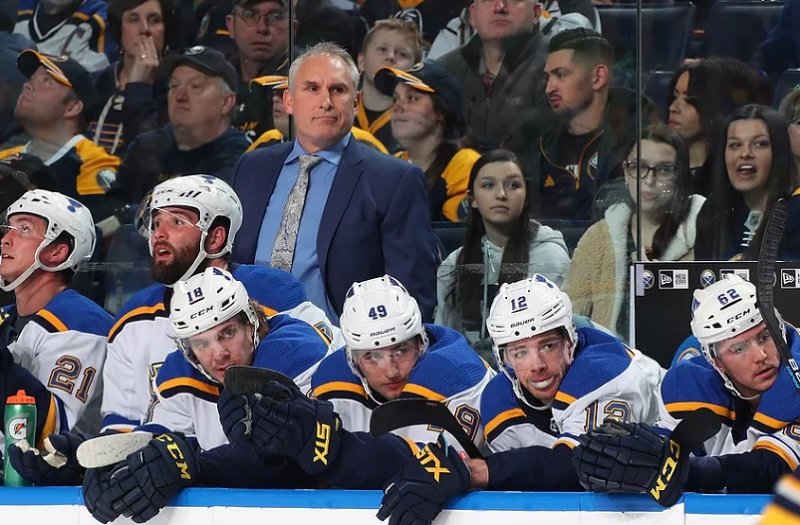“Play Gloria!” 10 Life Lessons from the 2019 Stanley Cup Champion St. Louis Blues
Earlier this month, my hometown St. Louis Blues won their first Stanley Cup in their 52-year franchise history. In true St. Louis sports fashion, their road to the Cup was nothing short of magical. On January 2, 2019 – halfway through the season – the Blues were dead last in the league. Their head coach had been fired in November. The team lacked a cohesive identity and looked more competitive when they were fighting each other at practice than when facing their opponents on the ice. The idea of the Blues even making the playoffs was simply laughable.
Jordan Binnington © Jasen Vinlove/USA TODAY Sports
Then on January 7, a rookie goaltender named Jordan Binnington stepped in front of the net for his first NHL start and recorded a shutout. The team started to click and adopted Interim Head Coach Craig Berube’s no nonsense, physical approach to hockey. The Blues went on an 11-game winning streak that lasted well into February. Laura Branigan’s song “Gloria” became the victory anthem for the team and the city of St. Louis.
At the end of the regular season, the Blues finished 3rd in the Central Division. Their playoff run started on April 10 in Winnipeg, and from then until June 12, they fought their way through 4 grueling rounds of playoff hockey, taking their fanbase on a wild ride all the way to the Stanley Cup title. It’s a story the sports world will be telling for years.
For the past 2 months, I had been nervously following the Blues and spending way too much time and emotional energy rooting the team on to victory. While I’d like to think my social media presence normally consists of worthwhile musings about manufacturing, craft beer, and podcasting, everything except my LinkedIn profile was covered in Blue. However, since my frequent Facebook jabs at the Boston Bruins and other on-ice foes might have been considered “unprofessional” or even unhinged at times, I thought I’d attempt to craft something more constructive here.
I’ve always loved drawing parallels between sports and business, but this post extends beyond career and the 9-to-5. Here are 10 life lessons that the St. Louis Blues taught us during their historic 2019 championship season:
1) Your past doesn’t have to define your future
52 years. That was the longest time any team in the NHL had gone without having a Stanley Cup to their name, and that record belonged to the Blues. They Blues hadn’t even made it to the Finals since 1970 despite decades of star players and a reasonable amount of success throughout their history, including a 25-year playoff streak that started in the 80’s.
It would have been easy for fans and naysayers alike to write the Blues off at any point due to their history. But as Blues Hall of Famer Brett Hull said, “History is merely a point of reference.”
It’s never too late to adjust course in life. Whether you’re looking to surround yourself with a more positive group of people, or you’re 52 years into your life and you want to make a career change, you don’t need to let your past limit what’s possible in the future.
Start that business.
End that toxic relationship.
Get that real estate license.
Write that song.
Win that Stanley Cup.
Ryan O'Reilly © The Sports Daily
2) You don’t need a title to be a leader
In hockey, you’ve got your team Captain. You’ve got your Alternate Captains. But even if you don’t have that “C” or those “A”s sown on your jersey, you can still step up and lead your team when it counts.
No one on the St. Louis Blues demonstrated season-long leadership better than Ryan O’Reilly. Even when the Blues were at their worst, Ryan was the one glimmer of hope on the ice. From being one of the team’s top point producers to running what his teammates called the “Ryan O’Reilly School of Hockey” – a series of post-practice hand-eye coordination and shooting drills – O’Reilly is a prime example of a player that puts in the extra time and effort to get the extra results, all while getting buy-in from the rest of the team. Those extras showed up big time in the playoffs, where O’Reilly snagged 8 goals, 15 assists, and eventually the Conn Smythe Trophy as the playoff MVP.
O’Reilly with the Conn Smythe Trophy © NBC Sports
All too often, people feel that leading requires a title like “Manager,” “Director,” or “Vice President,” but there is a massive difference between leading and managing. Managers have people that work for them; leaders have people that follow them due to their influence and vision.
If you’re an individual contributor like me, you know that getting things done at work requires you to influence people that don’t directly report to you. Leadership requires setting a vision, clearly communicating it, and in turn persuading the right stakeholders to get on board with that common goal. Whether you’re trying to close a multimillion-dollar order or win Game 7, it’s going to take more than just a captain to step up, lead, and get the job done.
Craig Berube behind the Blues bench © Bill Wippert/Getty Images
3) Nail the basics
One of the key contributing factors to the Blues’ midseason turnaround was Interim Head Coach Craig Berube’s direct coaching style. Focus on the fundamentals. Control the puck in the offensive zone and get to the net. Play physical and forecheck aggressively. Do your job on the ice, or we’ll find someone else to do. If you need any more proof of Berube’s direct style, check out his brief motivation speech before Game 7 of the Finals:
There are so many takeaways from Craig’s style that they deserve their own article, but my favorite part about his coaching methodology is his ability to get results by keeping it simple. If you have a lofty goal in your professional or personal life, that goal is almost always attainable by breaking it down and establishing the right habits.
Do you want to lose 50 pounds? Start by carving out 15 minutes to go for a walk everyday and ramp up from there, or just make a small tweak to your diet.
Interested in growing your professional network? Make it a point to go to 1 curated event specific to your industry every week.
These simple activities will compound over time and you’ll see tangible results start to build. Sometimes achieving your goals is a matter of taking a step back and getting the basics just right.
4) Facing adversity makes you stronger
Torey Krug – who did not win a Stanley Cup – taking out Robert Thomas in Game 1 of the Stanley Cup Finals
Down 2-0 against the Winnipeg Jets going into the 3rd period of Game 5 of the Conference Quarterfinals.
Trailing the Conference Semifinals 3-2 against the Dallas Stars.
An illegal hand pass and missed call that allowed the San Jose Sharks to win Game 3 of the Western Conference Finals in overtime.
The Blues had their backs against the wall more than a few times throughout the playoffs, and every time adversity struck, the Blues responded in force. How?
The Blues tied the Jets in Game 5 and dished them a backbreaking 3-2 loss with a goal from Jaden Schwartz in the game’s final 15 seconds.
Blues celebrate after Pat Maroon nets the game-winning goal against Dallas in the Western Conference Semifinals © Jeff Curry/USA Today Sports
After defeating the Stars in Dallas in a must-win Game 6, the series traveled back to St. Louis for Game 7 where hometown hero Pat Maroon netted the game-winning goal in double OT.
And despite that egregious missed call against San Jose, the Blues shook it off. They depleted the Sharks’ bench and beat them into submission for the remaining 3 games of the series to claim the Western Conference title.
There are pretty much 2 ways you can respond to a challenging situation; you can throw in the towel and call it a day, or you can use it as fuel to rise to the occasion. For the first time in my memory, the Blues displayed an unshakable level of mental toughness throughout the playoffs that every hurdle seemed like a blessing in disguise. This team just played better every time the going got tough.
When things aren’t going according to plan or you’re in a do-or-die situation, remember, you’ve survived 100% of your worst days. From losing your job to coping with a breakup, situations like these just plain suck. When these things happen, take a moment to refocus, assess the challenge ahead, and harness your strengths to move forward. You’ll be back on winning streak before you know it.
5) Ignore the haters
I’m talking to you NBC Sports! Whether it was postgame coverage or the Vegas odds, the Blues were underdogs in every series leading up to the Stanley Cup Finals, and they were met by even more doubters once they got there; two-thirds of analysts and editors from NHL.com to ESPN had picked the Bruins over the Blues.
Even if an opponent looks better on paper, it’s best to block out the noise and focus on your own game. When a reporter mentioned to Vladimir Tarasenko that teams that win the first game of the Finals win the Stanley Cup 77.2% of the time (the Blues lost Game 1 to Boston), Tarasenko’s response was perfect:
“That’s why you guys do the stats and we play on the ice…cool stats but it’s not in our heads.”
Vladimir Tarasenko © Chris Lee/AP
Just as the Blues focused on the things that they did well and were in their control, you too can “run with blinders on” and minimize the noise around you from critics or other distractions. Especially in today’s world where social media paints a picture that everyone else seems to have things figured out, take the actions you need to take with disregarding for opinions that don’t matter.
Start that travel blog you’ve always wanted to create, even if naysayers might criticize your work.
Post your first video to YouTube even if you’re nervous about how you look or sound on camera.
Don’t let the trolls stop you!
You might make mistakes and have some losses along the way, but you’ll learn as you go and ultimately come out a winner.
Alex Steen © Keith Gillett/Getty Images
6) Own whatever role you have
Alternate Captain Alex Steen used to put up 50 to 60 points in a season. He used to be on the first line. He was a “big-money” player.
But that was no longer the case in 2019, and in March, Craig Berube asked him to play on the Blues’ 4th line. Ouch. Talk about coming back down to earth.
Instead of sulking however, Steen did what was asked. He jumped onto a line with up-and-comers Oskar Sundqvist and Ivan Barbashev, and from then on, that group wreaked havoc on the opposition. Steen brought a senior sense of leadership to a 4th line that was just as valuable to the Blues as any other group on the ice. Their highly physical sense of play even nullified the efforts of the best players on the Boston Bruins’ “Perfection Line” in the final round of the playoffs.
Steen hoisting the Stanley Cup © Getty Images
There are a lot of lessons that can be learned from Steen here. Put your team first. Accept a new role – even a “demotion” – with humility. Execute your role like a boss, regardless of the job. The list goes on, but overall, I feel it shows the incredible results you can achieve when you’re willing to adapt to change.
Life is filled with setbacks, and every job – demotion, promotion, or otherwise – has non-glamorous responsibilities that you simply need to accept. If someone asks you to take on a task that seems menial or even below you (reality check: no job is “below you”), but you know it needs to get done for the good of the team, do it anyway. Our world needs more leaders that are willing to roll up their sleeves and take out the trash…particularly when that trash is Boston Bruins Forward Brad Marchand. 😉
7) You don’t deserve anything
Ryan O'Reilly chases down an aging Joe Thornton during the Western Conference Finals © USATSI
Maybe it’s because I live in the Bay Area, but I heard this sentence a lot this past May:
“Joe Thornton deserves a Stanley Cup.”
If you don’t know who Joe Thornton is, the 6-foot-4 enforcer is an NHL institution, having been playing in the league since 1997, and with the San Jose Sharks since 2005. Objectively speaking, he is a great hockey player.
But Joe Thornton doesn’t deserve a Stanley Cup. Neither did the Blues.
While no one “deserves” anything, you can absolutely go out there and earn it, and that’s just what the Blues did this season. Never once did I feel entitlement sweep over the city of St. Louis the way I felt it had engulfed San Jose. If the Blues were going to win, they were going to have to grind it out.
While the context surrounding this lesson is probably shrouded in more subjectivity than the rest of this article (I am, after all, a Blues fan living just north of San Jose), the point remains valid regardless of the team you cheer for. Entitlement eventually leads to an inevitable downfall. It leads to blaming everyone but yourself when things don’t go your way.
Whenever you feel like you deserve something, take a look at what that thing is, and figure out how you can work toward it.
Do you deserve a raise? Do the homework to quantify your value to your company, and have that courageous conversation with your manager.
Do you deserve the perfect partner? Decide what’s important to you in a relationship, and sign up for an online dating site.
Do you deserve a Stanley Cup? Win 16 playoff hockey games one game at a time.
All of these things take time, results, and focus to achieve. The only people that are most deserving are the ones willing to put in the effort consistently.
Jaden Schwartz and Carl Gunnarsson celebrate after a goal in Game 6 against the Winnipeg Jets © Getty Images
8) It takes a village
The St. Louis Post-Dispatch already beat me to the punch on this insight, so before we even get rolling, here’s your source!
Throughout the course of the playoffs, 20 of the 21 Blues’ skaters netted goals for the team. While O’Reilly may have been the MVP, there were no shortage of other players that stepped in to be the hero when they were needed most.
Jaden Schwartz pulled off a hat trick to knock out the Jets in Game 6 of the 1st round.
Garl Gunnarsson nailed the overtime winner from the blue line in Game 2 against Boston to tie the Finals series at 1 game apiece.
Laila Anderson with Colton Parayko
Heck, I’ll even accredit the consistent support and presence of folks like celebrity superfan Jon Hamm and team good luck charm Laila Anderson with contributing to the Blues’ on-ice success.
It goes without saying that success requires a team effort, but the depth of the St. Louis Blues demonstrated this too perfectly. From unsung team leaders stepping up (see bullet #2) to guys taking on the roles where they were needed most (cough…bullet #6…cough), everyone seemed to know where and when to do their part.
I’ve been lucky to be a part of some great teams throughout my career, and the best teams have been the ones where everyone has a unique strength to contribute. Whether you’re building out a team at work or for the non-profit you volunteer with on the weekends, don’t look for the people that are just like you. Seek out the people that bring something new to the table, especially different perspectives and experiences that can challenge conventional ways of thinking and make your team that much stronger.
Jordan Binnington © Dilip Vishwanat/AP
9) Fail fast and move on
Despite winning the 16 playoff games required to get the Cup, the Blues had to play 26 games to get there. That means they lost 10 times along the way, and often in a less-than-glorious fashion…
A 7-2 pounding by Boston in Game 3 during their first Stanley Cup Finals game at home in 49 years.
Then another 5-1 heartbreaker in Game 6 – once again on home ice – with a chance to win the Cup on the line.
But after every loss, the Blues accepted it, learned from it, and moved on.
The Blues came back to tie the series in Game 4 against Boston, and in Game 7…well, you know how that went by now.
No one on the Blues demonstrated an ability to move on to the next game better than goaltender Jordan Binnington. A 25-year-old rookie, Binnington possessed one of the biggest keys to success that most goalies don’t have: unshakeable mental toughness.
While Binnington didn’t have too many poor performances (his save percentage is a ridiculous 0.926), when he did, the remnants didn’t show up in the next game. Of the 10 games the Blues lost, only twice did they lose back-to-back games. Talk about bouncing back.
While the “fail fast and learn from it” mantra is very prevalent within the startup world these days, it’s a great approach to any speedbump in life. Did you botch a new product launch because of a design flaw or a misinterpretation of the needs of your target market? Oops! Did you get on the wrong bus in Croatia and go to Zadar instead of Split? Yup, I did that once. The point is, life is full of micro-losses, but when you can learn, reset, and move forward, you set yourself up for some even bigger macro-wins.
10) Take time to celebrate success
While Coach Craig Berube might have taken the same “focus-on-the-next-game” approach to winning in the playoffs as he did to losing, when the wins really counted, the Blues showed that they knew how to party:
And so did the city of St. Louis:
Aerial views of downtown St. Louis during the Blues’ victory parade © Justin Barr
Celebrating success has a number of physiological and psychological benefits that attract more success, and as much as I’d like to see the Blues win another Stanley Cup, the impact that celebrating has on strengthening a team or community warrants the most focus here.
Like any city, there’s no shortage of challenges facing St. Louis. Segregation. Violence. Blight. But the Cup run broke down barriers and created something for the entire city to rally around. Sports don’t solve problems, but they can provide a glimpse into the positives that are possible when people come together.
We all celebrate promotions at work and graduations with family, but make an effort to celebrate the little things along the way too. Send a short, handwritten note to a coworker or client when they go above-and-beyond what is expected. Call a friend to say “Congrats!” when you see them post an accomplishment to social media that they’re proud of. Acknowledge the individual accomplishments of each member of the team after a successful project.
Wins don’t always come easy. You might even need to endure a few more losses before you get there. But, when you get that big win, bust out the champagne, and above all else…
Play Gloria.
What has your favorite sports team taught you about life, leadership, and perseverance? Leave your thoughts in the comments below! Also, sorry to all fans of the Winnipeg Jets, Dallas Stars, San Jose Sharks, and Boston Bruins...
















